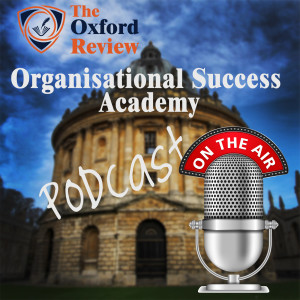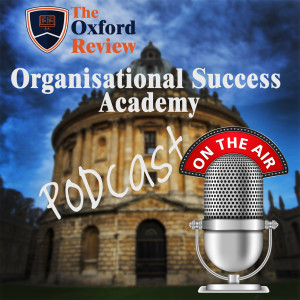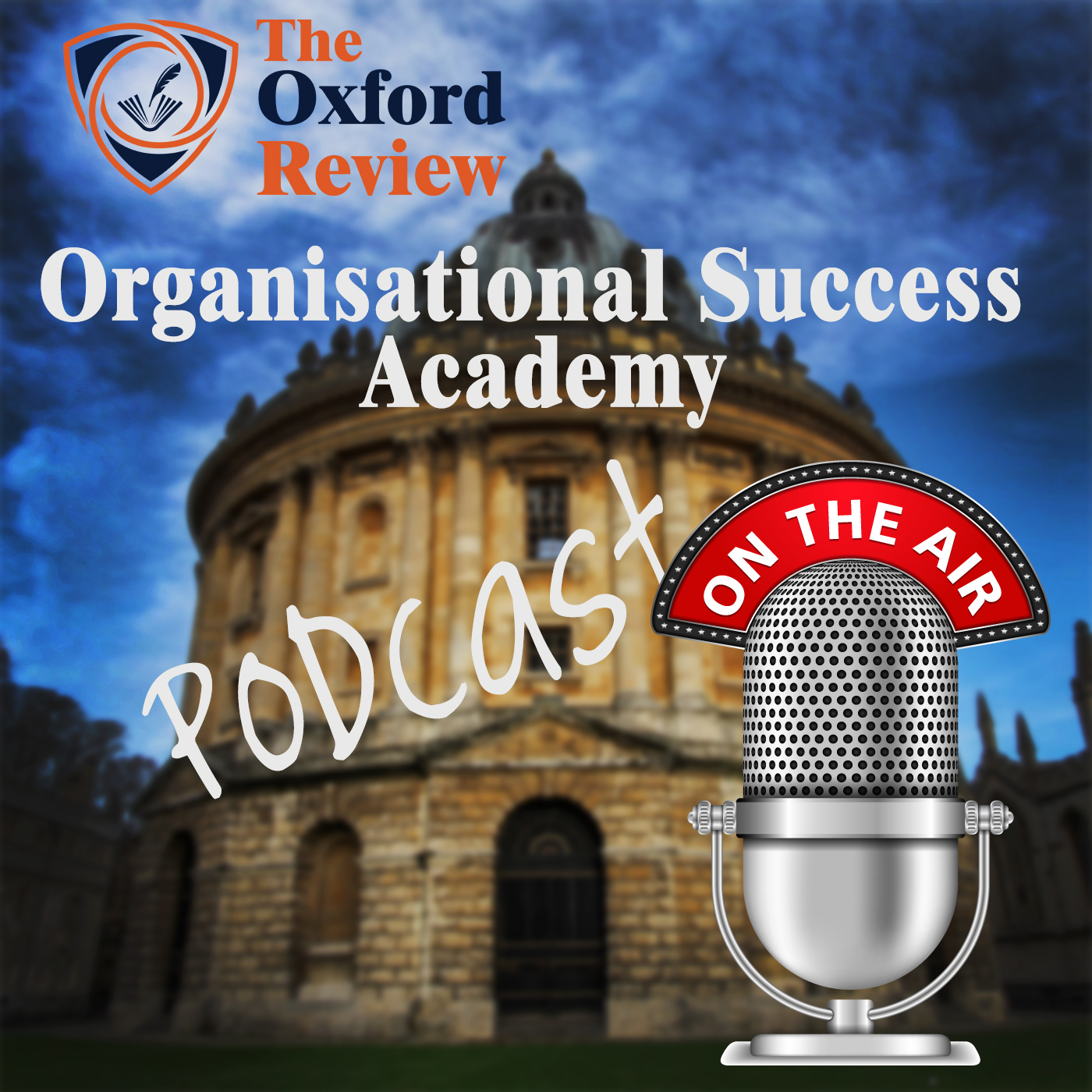Episodes

Friday May 24, 2019
Friday May 24, 2019
More and more organisations are turning to big data to inform their decision-making, however they are finding that all is not well when they try to use big data.
A new study by researcher Maryam Ghasemaghaei and Goran Calic from De Grot Business School at McMaster University looking at why organisations often end up abandoning the use of Big Data in their decision making, makes for some useful and interesting reading.
In this podcast I interview Dr. Maryam Ghasemaghaei about her research and findings.
For the transcript and more go to: https://www.oxford-review.com/why-organisations-are-having-problems-using-big-data/

Friday May 10, 2019
Friday May 10, 2019
Social norms are the rules that guide and constrain behaviours within any culture or society and both stem from and control what is appropriate behaviour within that environment. Social norms are the arbiters of order, organisation and structure within any society. However, despite the fact that they regulate social interactions and maintain order within a society, norm violations are frequent.
A number of previous studies have found that in many societies, regular and blatant norm violators tend to be controlled, often in subtle ways, and they are frequently prevented from being able to gain positions of influence.
These are normal parts of everyday life, but the questions are:
- Why do some people violate social norms?
- How are norm violators controlled and their influence restricted?
- Why and who are the arbiters of social norm following?
For more about this podcast including full transcription and notes click here

Friday May 03, 2019
Developing organisational ambidexterity the implications for HR, L&D and OD
Friday May 03, 2019
Friday May 03, 2019
One of the big themes emerging from the management and organisational development literature at the moment is that of organisational ambidexterity.
A problem that has dogged many organisations is how to continue to exploit its existing capabilities whilst at the same time developing and exploring new ones.
A new study and review... To see the transcript, references and more go to: https://www.oxford-review.com/developing-organisational-ambidexterity-podcast/

Wednesday Apr 24, 2019
The Characteristics of a successful Management Mentor
Wednesday Apr 24, 2019
Wednesday Apr 24, 2019
Mentors have long played a significant role in the development of individuals within organisations. One of the more successful approaches to mentoring has been inter-organisational schemes where mentors from other organisations help new and developing leaders and managers to get to grips with their role and to see things from different perspectives...
For the rest of the notes, blog post and transcript go to: https://www.oxford-review.com/the-characteristics-of-a-successful-management-mentor-podcast/

Tuesday Apr 16, 2019
Story selling: Using stories to persuade
Tuesday Apr 16, 2019
Tuesday Apr 16, 2019
Being able to persuade or sell to others effectively is a core part of many people’s occupation and position. For example, leaders need to persuade followers, managers need to persuade employees and, generally, many people are put in a position where they are trying to persuade others about ideas, concepts and products. The art of persuasion has received much attention over the years from researchers and authors.
Whilst many people and organisations don't like to think of it like this, getting people to accept ideas, practices and change is in fact a sales process. A number of previous studies have shown that storytelling is a hugely effective method of persuasion and selling.
A new (2019) study looking at the impact of storytelling on sales and persuasion and on the effect of teaching people to use storytelling throughout the sales/persuasion process has just been published which looks at the impact of teaching students to incorporate storytelling into their sales processes.
In this podcast Sarah Smith (Contributing Editor) and David Wilkinson (Editor-in-Chief) look at how to use stories to sell ideas and products.

Monday Apr 08, 2019
Monday Apr 08, 2019
When Employees get pissed off: Employee dissent spirals and how to deal with them as a manager
It is estimated that somewhere between 50 and 70% of employees, will, at some point in their employment feel that the organisation has wronged, mistreated or let them down in some way.
These issues are referred to as psychological contract breaches. This is where an employee feels that the organisation has failed to fulfil its obligations to them. Over the years there has been a considerable amount of research attention looking at these psychological contract breaches and their effect.
Psychological contract breaches and dissent spirals (explained in the podcast) can occur at any time but are particularly prevalent in times of organisational change.
In this podcast David looks at new research about how to deal with perceived psychological contract breaches and prevent dissent spirals, which can lead to all sorts of negative consequences for the employee, the managers and the organisation.

Sunday Mar 31, 2019
Getting people to take responsibility for their own learning in a CoP
Sunday Mar 31, 2019
Sunday Mar 31, 2019
Getting people to take responsibility for their own learning and helping to drive and engage in Communities of Practice is often hard work and frequently fails. The question is why? A research briefing sent to members in 2016 shows why it is difficult to get people to take responsibility for their own learning and engage in things like communities of practice and importantly what to do about it.
#learning #CoPs #CommunitiesOfPractice #autonomy #TakeResponsibility #Coaching

Monday Mar 18, 2019
Is the use of strengths at work as powerful as many people think?
Monday Mar 18, 2019
Monday Mar 18, 2019
Is the use of strengths at work as powerful as we might think? What are the factors that matter?
Keywords: Character, signature strengths, well-being, organisational behaviour, trait affect, job satisfaction, job strain
Many organisations today recognise the benefits of leveraging the positive qualities of employees, as well as minimising any problematic areas. Research in the field of positive organisational scholarship suggests this approach is well placed, with positive outcomes being seen from the development of employees’ strengths, maximising positive emotional states, and encouraging flourishing. In particular, the use of signature strengths at work has been associated with a variety of positive outcomes over the long term.
In this episode Sarah and David discuss some new research around the use of individual, personal or character strengths in organisational contexts.

Thursday Mar 07, 2019
Does your organisation's reputation make any practical difference?
Thursday Mar 07, 2019
Thursday Mar 07, 2019
In this podcast David provides a research briefing on some new research looking at the effects of corporate reputation on the people who work inside the organisation and the organisation’s performance in the market and has made some interesting finding.
#research #reputation #orgdev #corporatereputation #oxfordreview

Tuesday Feb 26, 2019
Paradoxical leader behaviours - new study
Tuesday Feb 26, 2019
Tuesday Feb 26, 2019
Today’s organisations are increasingly facing environments characterised by complexity, volatility and uncertainty, placing extra demands on leaders to adopt holistic thinking approaches in order to meet organisational and individual needs. Leadership approaches are shifting, and organisations arguably require even more creativity than before.
In this podcast Sarah and David explore a new study which has explored the impact of a new theory of leadership known as paradoxical leadership behaviour. Paradoxical leadership behaviour focusses on levels of ‘thriving at work’ (employee vitality and learning) and psychological safety (employee perception of safety to express own views without negative consequences), and their influence on employee creativity.
Please rate and review and let us know what organisational and people research you are interested in. You feedback is essential to helping us bring you the content you need in a way you want to get it.
Thank you!

